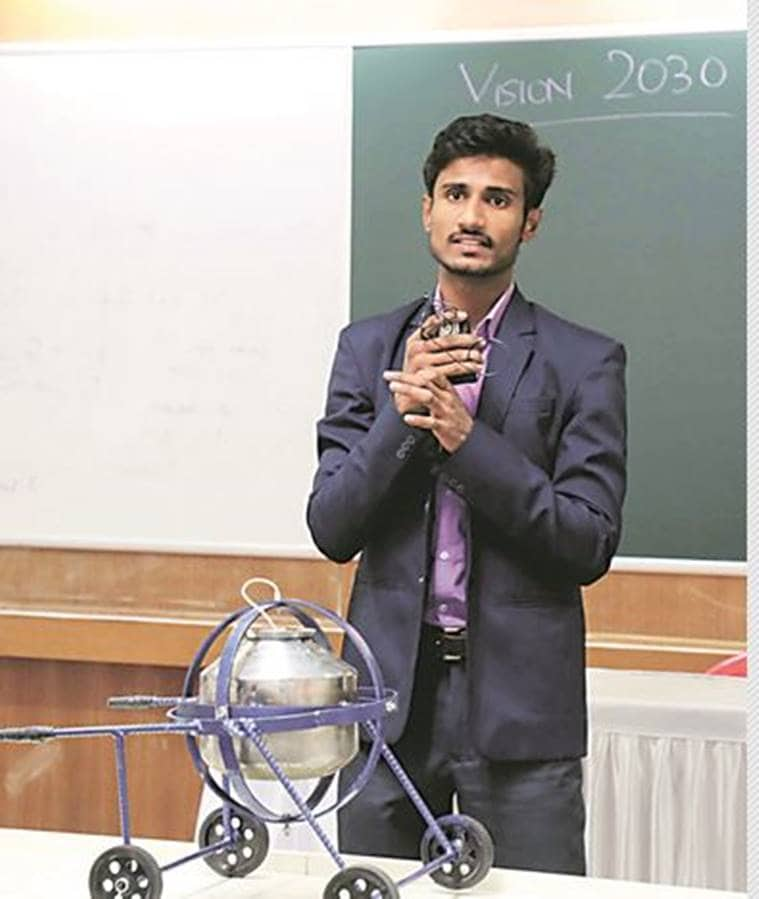 In 2019, Tanveer Inamdar the Rex-KarmaVeer Fellowship, instituted by International Confederation of NGO (iCONGO) in partnership with the United Nations.
In 2019, Tanveer Inamdar the Rex-KarmaVeer Fellowship, instituted by International Confederation of NGO (iCONGO) in partnership with the United Nations.
According to a Niti Aayog report from 2018, titled ‘Composite Water Management Index’, 2 lakh people die annually due to lack of access to safe water and 600 million suffer from “high to extreme” water stress.
Across India, the burden of fetching water for families falls on women. Millions, from little girls to elderly women, spend several hours every day walking long distances at a stretch to the nearest source of water. In some villages of Maharashtra, an innovation has attempted to make their task easier. Called NeerChakra, after the Sanskrit words for ‘water’ and ‘continuity’, the transport device has been created by Pune-based TREE Innovative Foundation.
In 2019, it won innovator Tanveer Inamdar the Rex-KarmaVeer Fellowship, instituted by International Confederation of NGO (iCONGO) in partnership with the United Nations. As part of a project called Mission Parivartan, Inamdar has set a target of taking the device to 7,000 families in 200 villages across 14 districts of the state by the end of 2021. He talks to Dipanita Nath about how, in the first month of this year, he has reached out to seven villages. Excerpts from an interview:
Who inspired you to create NeerChakra?
I am a mechanical engineer from Pune and had never gone to a village, except on picnics, before 2019. I was at a tribal village called Shilim, near Pavana dam last year when, on the last day of my visit, a woman collapsed in front of me. She was pregnant and lost her baby. I was shocked at this incident and called my mother, who told me that in her childhood, she, her mother and other women would fetch water from very far and carry it on their heads. They, too, had suffered accidents and abortions as a result. I was emotionally triggered to do something.
How does NeerChakra operate?
I built NeerChakra based on the ancient principles of the Gimbal ink pot in which the ink does not spill even if there is force or pressure from any side. NeerChakra has been designed in a way that it can carry 80 litres of water at once. A person can wheel it over sandy, rocky or plain surfaces, hilly terrain or flat ground. We found that women, who fetch water, also suffer from anaemia, among other illnesses, and are malnourished and physically weak. The prototype of NeerChakra was such that it required 40 kilos of force to push and pull it. We realised this would not work and continued to tweak the design until we came up with the present model, which required seven to eight kilos of force. We also introduced brakes and water filtration system in the device. We ran the pilot for a month last year in Saswad. Previously, women would spend three to four hours to fetch water. Take for example, an old woman, who has to fetch water several times in a small container. Now, she can bring 80 litres in a single trip and, for two to three days, doesn’t need to fetch water.
What is your business model?
We sell NeerChakra for Rs 3,900 to organisations working on CSR (corporate social responsibility) initiatives and NGOs. We also have a dual, hybrid structure for users when we deal with them directly. If the family is economically deprived, we give it away for free, but if the family can afford it, they pay us 10 to 20 per cent of the cost, which is Rs 400 to Rs 800 per device.
Have you experienced any resistance to the product from users?
The cost of the device was definitely a problem because tribal people could not afford it. The initial five models cost Rs 7,000 per piece and we optimised it again to bring it down to Rs 3,900. At present, we are trying to bring the cost down to Rs 2,000. We also face a mental block on the part of the users. We found that a lot of men don’t want women to use the device. The women, too, need to be counselled into changing their thinking. Earlier, in certain hilly regions, they would take a short cut down to the well but with NeerChakra, they need to use the kutcha path, which is longer for them. Volunteers help us to reach out to families and raise awareness among them.